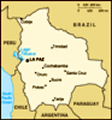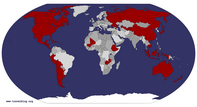Advertisement
FACES OF BOLIVIA...Nationalism. As we leave Bolivia's back door to enter the Atacama Desert in Northern Chile I can hear my heart pounding with anticipation.
'Cause this is why we tacked Peru & Bolivia onto our North American & Caribbean Blues Cruise itinerary.
We have always wanted to visit the World's driest region, the Atacama Desert...even before we were seduced by the wonders of 4WDing through the wilds of Patagonia in southern Argentina and Chile.
We are at the border at Hito Cajon 4,480m (14,698 ft)...leaving Heaven...the cries of the vanquished still ringing in our ears.
Because Bolivians it is fair to say...do not like Chileans.
When we were in Patagonia, the Argentinians we met did not like Chileans. The reason we were given was that the Chileans sided with the British over the Falkland Islands War in 1982. Do you remember that one?
Every day on the news there would be the defiant cries of Maggie Thatcher...Maps showing a long line of battleships and frigates in single file heading from Britain to the South Atlantic...the war over seemingly in minutes after they arrived...the memories of the Argentinians defiant to this day.
But
Bolivian memories are even longer...much longer.
Bolivia and Chile have recently been doing battle in the International Court of Justice.
The War of the Pacific (1879 - 1884) It goes back to The War of the Pacific by which Bolivia gave up it's access to the Pacific Ocean to the conquering Chileans in 1884 which was confirmed in the Treaty of Peace and Friendship in 1904 .
Bolivia has been landlocked ever since.
Peru was also caught up in that war supporting the Bolivians, but after Chile captured Lima in 1881, Peru capitulated in 1883 and by the Treaty of Ancon ceded part of their southern coast to Chile.
Argentina snatched part of Southern Bolivia in 1899.
We loved Bolivia with a passion...but they don't have much luck it seems when it comes to wars!
The excuse we were given was they would be too busy partying and Chile invaded during a fiesta !!!
The age of colonialism whereby Spain, Portugal, France and Britain had divided South America among themselves so they could plunder their riches and place their peoples in servitude, crumbled in the 19th century.
Chile
gained independence from Spain in 1818 and Bolivia in 1825.
It seems the borders between the two new nations were ill defined but Bolivia had a seaport at Antofagasta and it's territory included the Atacama Desert.
From 1842 the Chileans and the Bolivians in various deals divided areas of the Atacama Desert between them following discovery of rich mineral deposits of sodium nitrate, copper and silver. By the late 1870s it got a bit out of hand.
Not only did Bolivia and Chile claim the area as it's own but British, Spanish and USA companies wanted the resources for explosives and fertilizers, and made deals with respective governments for mining rights that were disputed by the other country.
Ultimately it is said a tax dispute led to war in 1879...so named The War of the Pacific.
In 1872 Bolivia signed a contract allowing a British company the right to mine sodium nitrate for 15 years.
In 1873 Peru and Bolivia signed a "secret alliance" guaranteeing the sovereignty of their territories, but did not include or advise Chile.
In 1878 Bolivia placed a tax on the extraction of sodium nitrate.
However, the British
concessions had been transferred to a Chilean company and Chile claimed the imposition of the tax by Bolivia as breaching a Treaty of 1866 in which Bolivia had agreed not to increase taxes without Chile's approval.
Chile asked Peru for a proclamation of neutrality, but as Peru did not respond Chile declared war on both Peru and Bolivia on April 5, 1879. The War of the Pacific had begun.
In 1883 Peru caved in and a year later in April 1884, Bolivia and Chile signed a treaty that ended the War of the Pacific and Bolivia gave up it's 240 miles of coastline to Chile.
As a result Chile prospered gaining areas of rich mineral wealth.
Peru lost mineral rich areas in its south to Chile, some of which it regained in 1929.
Bolivia lost more than 46,000 square miles of land, including it's copper rich Antofagasta region.
In 1889 a railway was built from Antofagasta on the coast to Uyuni in the Bolivian Altiplano.
In 1895 Chile and Bolivia signed another treaty that gave hope to Bolivia that it would have at least one port on the Pacific coast, that Chile promised
to transfer Tacna (in southern Peru) and Arica (that it had already annexed from Peru) to Bolivia should Chile obtain them, or if not, the Caleta de Vitor, a small port south of Arica.
Not much help to Bolivia as in 1929 Peru and Chile signed a treaty that prevented rights to Tacna and Arica to any third country!
On October 20, 1904, The Treaty of Peace and Friendship between Chile and Bolivia set the national border between two mountains.
Chilean sovereignty was recognized by Bolivia over the territory from the ocean to the existing Argentine boundary between the 23rd and 24th parallels.
Chile also recognized the right of Bolivia in perpetuity to commercial transit through its territory and ports, to be regulated by special agreements. In 1907 another treaty meant Chile had sovereignty over the Chilean section of the railroad from Antofagasta to Uyuni.
The countries have been haggling ever since, Chile always in control as Bolivia was landlocked.
******
The proposals of 1975 In 1975 Augusto Pinochet, the Chilean dictator proposed granting a narrow corridor of land from Bolivia to the coast in exchange for a swap
of a similar area of land from Bolivia.
The narrow corridor was land annexed by Chile from Peru by the Treaty of Ancon in 1883, that was adjacent to the border of Peru.
However, the Peruvian dictator, Francisco Bermudez said this breached the Treaty of Ancon whereby Chile could not give rights to any areas annexed by Chile without prior approval of Peru.
Peru proposed the port of Arica (then held by Chile) be governed by Chile, Peru and Bolivia, which guess what? Chile opposed that!!!
Chile was allowing unrestricted access of Bolivian goods to Chilean ports but Chilean companies retained control.
In 2004 a dispute arose as Bolivia opposed the export of any of its newly discovered natural gas to be transported across Chilean territory.
One of the activists was an indigenous Bolivian man, Evo Morales, who was later to become President of Bolivia.
A new surge of Bolivian nationalism was emerging.
******
Evo Morales The majority of the population of Bolivia are indigenous. It was therefore a true popular vote in December 2005 that Evo Morales, an Aymara Indian was elected the first indigenous President,

 Evo Morales
Evo Morales
From Wall Street Journalpromising to bring the marginalised indigenous population greater prosperity.
We had lots of chats with our guides in Bolivia, who were also indigenous, and this is what we were told.
Morales got straight to work and nationalised gas and mining production and foreign companies were slugged with 75% company tax. Some companies refused but due to massive potential mineral wealth, some companies stayed and prospered.
Bolivia always known as economically poor, started to prosper and it's GDP has been growing for the last 10 years.
While Bolivia has some of the largest reserves of lithium and other rare metals, Morales wants Bolivia to control production , and is working towards Bolivia developing the technology , rather than allowing foreign companies to do so.
Lithium...the green energy power source for mobile phones, ipods, electric cars...enough under the Uyuni Salt Flats to make Bolivia "the Saudi Arabia of Lithium", says Morales.
But Chile and Argentina also have lithium and are ramping up production.
Will Bolivia miss out waiting for their mastering of technology to keep the profits in Bolivia rather than the bank accounts of multi nationals?
Will the populous wait...or will greed and
avarice take over?
An avowed Socialist, Morales is to my mind remarkably democratic.
The Bolivian Constitution only allowed the President to run for a single 5 year term. So Morales changed the Constitution to allow him to run for a second term, which he won, then changed the Constitution again to allow him to run for a third, which he won in 2015!
But do not scoff...each change was approved by the people by National Referendums.
Morales does not mind telling other international powers to get nicked.
When the USA tried to stop coca production in Bolivia for fear it was grown for cocaine production, rather than just for chewing and coca tea consumption (best remedy for altitude sickness), Morales told the USA to get nicked. Interestingly, Morales was head of the coca production union before his election as President.
I smiled as our vehicle was searched for cocaine by the man who is my opening picture!
Morales continues to press the Chileans for sovereign access to the Pacific Ocean.
Gotta have somewhere for the Bolivian Navy to hang out...and don't they have the Day of the Sea every 23 March by
marching through the streets with model ships and pictures of the ocean and with the landlocked country’s navy in full uniform?
Bolivia -v- Chile in the International Court of Justice. Landlocked since 1884...times may be a changing...Bolivia may soon touch the sea once more.
In September 2015, the International Court of Justice ("ICJ") at the United Nations ruled 14-2 that it would hear the Bolivian government’s argument that Chile must negotiate with it for a new route to the sea.
The BBC reports a final decision is months, if not years, away.
While Bolivia still has access to ports in northern Chile, Bolivia has said Chileans have backed out of agreements granting Bolivia access to other ports.
Bolivian hopes to gain sovereign access to the Pacific Ocean, in order to import and export goods and raw materials without paying costly tariffs to neighboring Chile and Peru.
Chile has invoked the 1904 treaty to defend its claim on the territory, saying that "no one in the world will accept that a country unilaterally dismisses a treaty which is in full force.”
Despite Evo Morales' claim that the treaty was forced on

 Gonzales
Gonzales
Our guide for Sucre to Potosihis country “down the barrel of a gun,” Bolivia's claim, filed with the ICJ in April 2013, only asks the court to compel Chile to negotiate in good faith with Bolivia over access to the sea.
I being a humble dancer, do not know if the ICJ has the jurisdiction or clout to force or determine where that land should be.
Bolivia had argued that Chile was required to respect the jurisdiction of international courts when it signed a separate multilateral treaty in 1948, known as the Pact of Bogotá. Chile argued that the pact wasn't relevant to this case because the countries had established borders in the peace treaty.
Chile argued its territory was defined by previous treaties, but the ICJ ruled prior treaties did not cover “Chile’s alleged obligation to negotiate Bolivia’s access” to the Pacific Ocean.
Chile’s president, Michelle Bachelet who was elected in late 2013 with 62% of the vote has seen her popularity shrink to just 20%, while disapproval of her administration reached 72%, according to a recent poll. The Chilean public, however, has shown strong support for resisting giving up control over the land in question.(BBC Report).
Yet Chile

 Valerio
Valerio
Our driver to Follow the Dakar Rallystill has the upper hand until Bolivia gains land access to the sea.
TeleSur reported on 5 June 2016 that executives of the Port of Antofagasta told Bolivian exporters they would increase tariffs and other measures that limit trade of Bolivian cargo through the Chilean port. Morales of course says it breaches and was an "unfair and discriminatory decision," since Chile is violating the 1904 treaty that was signed to lower the costs of Bolivian imports.
According to Alurralde the tax rate for Bolivian cargo in Chile's port was US$ 1.87 per ton in 2004, and last year it grew to US$ 7.64.
To my mind, Bolivia regaining it's own sovereign territory to the sea cannot come soon enough!
******
Ahhh...here is our Chilean driver to take us from 4,480 m to sea level.
He's got a ponytail and he looks tough. Don't worry...you won't get any argument from me.
We hug Geneth and Valerio one last time...eyes misting...fabulous memories welling up.
Thanks for following the Dakar Rally with us.
Gotta say Geneth...we'll miss your wicked humour.
And we bow to you Valerio...surveying the route of the Dakar

 Geneth
Geneth
Our guide to Follow the Dakar RallyRally...you sure set a thrilling course.
Adios and Adieu.
Time to leave Heaven...and return to Earth.
Relax & Enjoy,
Dancing Dave
Advertisement
Tot: 0.103s; Tpl: 0.023s; cc: 10; qc: 34; dbt: 0.0351s; 1; m:domysql w:travelblog (10.17.0.13); sld: 1;
; mem: 1.1mb



























Home and Away
Bob Carlsen
This is the first blog of yours that sounds like a legal brief...
and that you are itching to take the case. I agree with you that Bolivia has been wronged...a case where might makes right...with Chile being the mighty power which can impose its will on its neighbors.